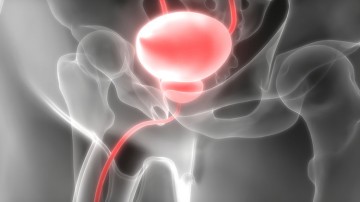Health Articles
Men may not think much about their prostate until they have problems with it. But why wait until something goes wrong? This walnut-sized gland located between the bladder and the penis has the important job of producing the fluid that together with sperm cells from the testicles and fluids from other glands makes up semen.
The earlier in life a man does think about it, the greater the likelihood of avoiding potential issues in the future. All men can and should take preventative steps to keep their prostate in tip top shape regardless if they have a family history of prostate cancer or not.
According to the American Cancer Society, about 161,360 new cases of prostate cancer will be diagnosed in 2017. About 1 man in 7 will be diagnosed with prostate cancer in his lifetime.
Here are 7 ways a man can improve his chances of keeping his prostate healthy and cancer free:
1. Maintain a healthy body weight and exercise regularly
Men should reach a healthy body weight for their height paying particularly attention to reducing central abdominal obesity or belly fat. Keeping a consistent, regular exercise program can help maintain weight and keep it from accumulating in the belly area.
2. Eat more fruits and vegetables
Men should consume at a minimum 5 servings of fruits and vegetables each day. The more colorful produce eaten the better. Choose from tomatoes loaded with the phytochemical lycopene along with pink grapefruit, watermelons, and papaya also containing this healthy compound for prostates. Cruciferous vegetables are always a good choice for preventing all cancers and include broccoli, cauliflower, cabbage, Brussels sprouts, Bok choy, and kale.
3. Don’t smoke
The role of smoking appears to increase the risk of prostate cancer by affecting circulating hormone levels or through exposure to carcinogens. If a man currently smokes, he should seek help in quitting as soon as possible.
4. Choose foods rich in selenium
The mineral selenium has been found in studies to have a role in preventing prostate cancer. Include more selenium rich foods such as wheat germ, tuna, herring, beef liver, eggs, sunflower and sesame seeds, cashews, mushrooms, garlic, and onions.
5. Know your family history for prostate cancer
It’s always advisable to know your family medical history and for a man it is important to know if any first degree relatives (father or brother) ever had prostate issues or prostate cancer. Men with a brother who had prostate cancer have twice as high a risk of being diagnosed compared to other men or a 30% risk of being diagnosed before age 75 compared with about 13% among men with no family history. Men with both a brother and father with prostate cancer have about 3 times the risk as the general population or a 48% chance of getting any type of prostate cancer compared to about 13% among other men.
A man’s doctor needs to be informed of this as any man having a father or brother with prostate cancer has double the chance of developing this disease.
6. PSA blood test and digital rectal exam
The standard tests for checking a man’s prostate is the prostate specific antigen (PSA) and digital rectal exam. A man should consult with his doctor as to when these tests should begin but they should be done annually once they are started.
7. Keep stress to a minimum
When the body is under stress, it deals with it by raising levels of certain hormones, including adrenaline and cortisol. Unfortunately when stress is chronic, cortisol levels remain high which in turn elevate inflammation. Stress can worsen urinary tract symptoms associated with benign prostatic hyperplasia (BPH), such as urinary urgency, painful urination, dribbling, and urinary frequency. To prevent stress from taking control, incorporate stress-reduction techniques. Yoga, tai chi, deep breathing, meditation, guided visualization, and exercise all can be effective at alleviating stress.

